Updated: 19 December 2020
Sometimes, my students ask me how to say a Persian word or phrase in English, and I realize there’s no equivalent because it’s cultural. One of the best examples of this that comes up over and over again is khasteh nabâshid. In other cases, there isn’t a good translation, but only “the closest meaning.” Often times, I’m talking with my siblings, and we say a word in Persian because the English doesn’t even begin to capture what we want to convey quite like the Persian does. And this is true of any language. When the English book I teach from says something is “cheesy,” it’s hard to explain that to my students, too. So I started noting all these Persian words that I thought had English translations that just didn’t cut it. These are the words where when I hear the Persian, I imagine one thing, and when I hear the English translation, I imagine something else. Sometimes, it’s the word itself that sounds better, and other times, it’s the nuance behind the word that gives a world of context. So here we are with the first part of 10 Persian words with unsatisfactory English translations.
Shekamu
شکمو
We get shekamu (or shekamoo) from shekam which means “stomach”. English translations come out either far too negative or far too posh: fatty, glutton, gourmand, epicure. But shekamu is cute and has nothing to do with whether or not the person is fat. It’s just someone who loves to eat and is always thinking about satisfying their belly, along the lines of a foodie. But “foodie” sounds so boring. Shekamu is more like a cute, adorable foodie.

Degh kardan
دق کردن
Is it possible to die of a broken heart/grief/sorrow? Iranians think so. And degh kardan is the word for it. Even though we very well may mean it, a lot of times Iranians use this word in an elaborate show of drama. In the comedy film Sa’at 5 Asr (5 in the Afternoon), a man is helping an old lady fill out the paperwork for her deceased husband. When he asks her for the cause of death, she simply states degh kard. “No, no,” he says. “I mean, what was the medical cause?” And she replies, “I told you. Degh kard.” I think the fact that there is a single word for this in Persian is very telling of the culture.
Kucheh
کوچه
The closest translation for kucheh is “alley,” but to me, the English means something entirely different from the Persian. Who’s with me on this? When I say “alley,” I see a sketchy narrow space between two buildings, some dumpsters (possibly with stray cats jumping out), a fire escape, maybe a few beat-up boxes casually tossed out, steam rising from the subway grate, and the sound of a police siren in the distance. It’s the perfect setting to be held at gunpoint (or get jumped like Joaquin Phoenix in Joker).
But when I say kucheh, I see a residential lane off the main street. Some have shallow gutters running down the middle that make you sigh and long for the good ol’ days. You’ll find the neighborhood kids playing soccer in the kucheh. Others are charming and so narrow only one person can walk down them at a time.
Many of the lovely adobe kucheh in Yazd have shade-providing arches above them. There are also kucheh âshti konun (make-up alleys), named as such because it’s said that if two people were on non-speaking terms (see below, ghahr kardan) and walked down one of these alleys, they’d brush shoulders and therefore be forced to talk and hopefully make up.
We also have kucheh bâgh in the countryside. These are the [typically] dirt paths around gardens and people’s property.
All in all, “alley” instills a sense of fear in me… a need to be on full alert with my finger on the pepper spray (just in case). Kucheh gives me a sense of serenity and hominess.
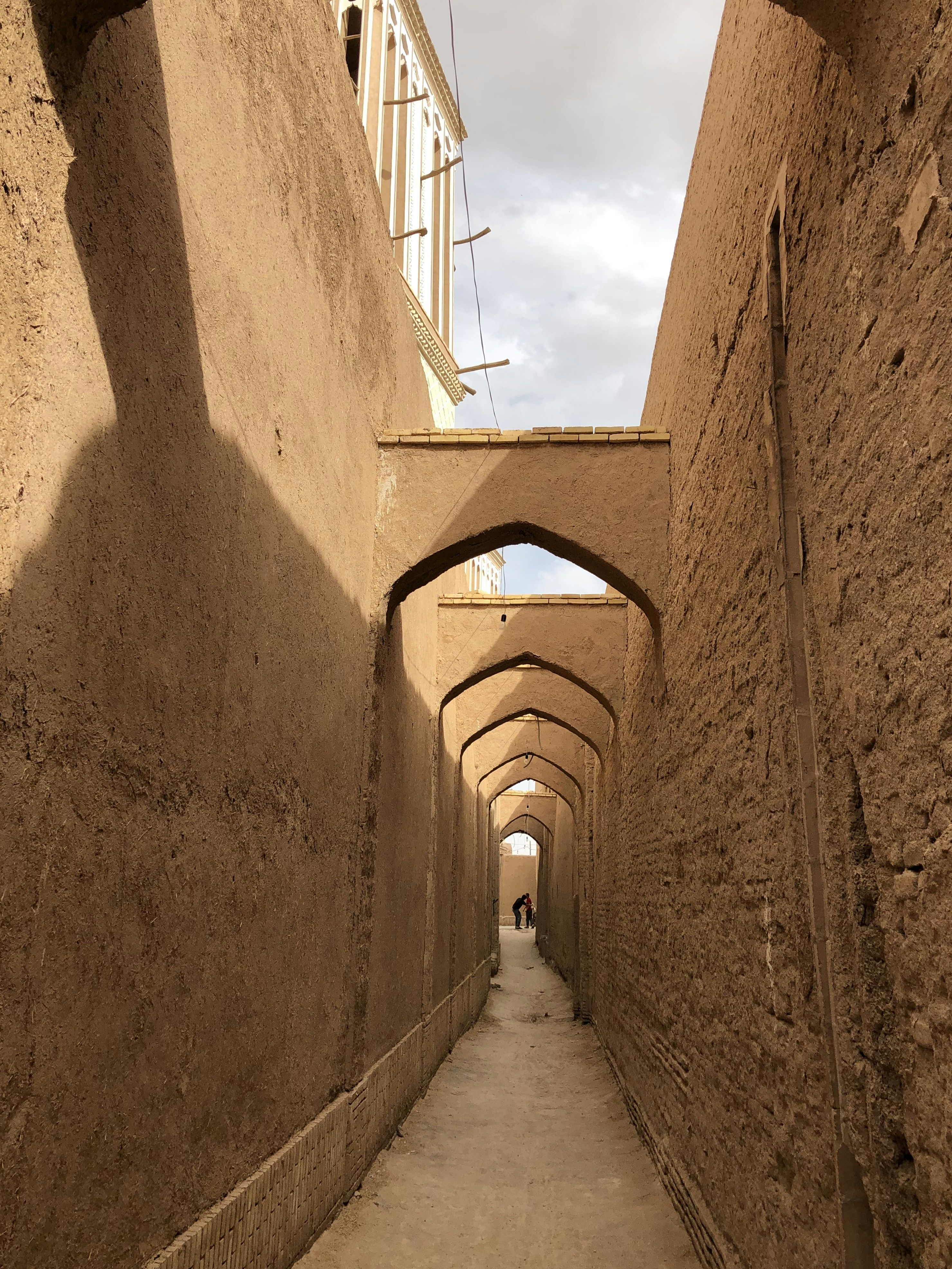
Bâgh
باغ
And speaking of bâgh, the English “garden” seems inadequate to describe what a bâgh is in Iran. Sometimes my students tell me they went to a friend’s bâgh over the weekend and are unsure whether or not they should use “garden.” I know what they’re talking about, but “garden” is strange in that context. It’s not totally a garden. Not totally an orchard either. But those seem to be the closest meanings. Bâgh implies a lavish green space filled with all combinations of decorative flowers and shrubs alongside shade-providing and fruit-bearing trees with streams of water running through them. Think of the amazing UNESCO-listed Persian Gardens. My mom and aunts have some pretty hilarious tales of their own bâgh growing up. They worked as a team, with some sisters scaling the adobe wall to steal fruit from the neighboring bâgh and toss it in the stream that connected the two, so the other sisters could grab it as it floated over to the other side.
I think if we mix garden and orchard we can begin to understand bâgh.
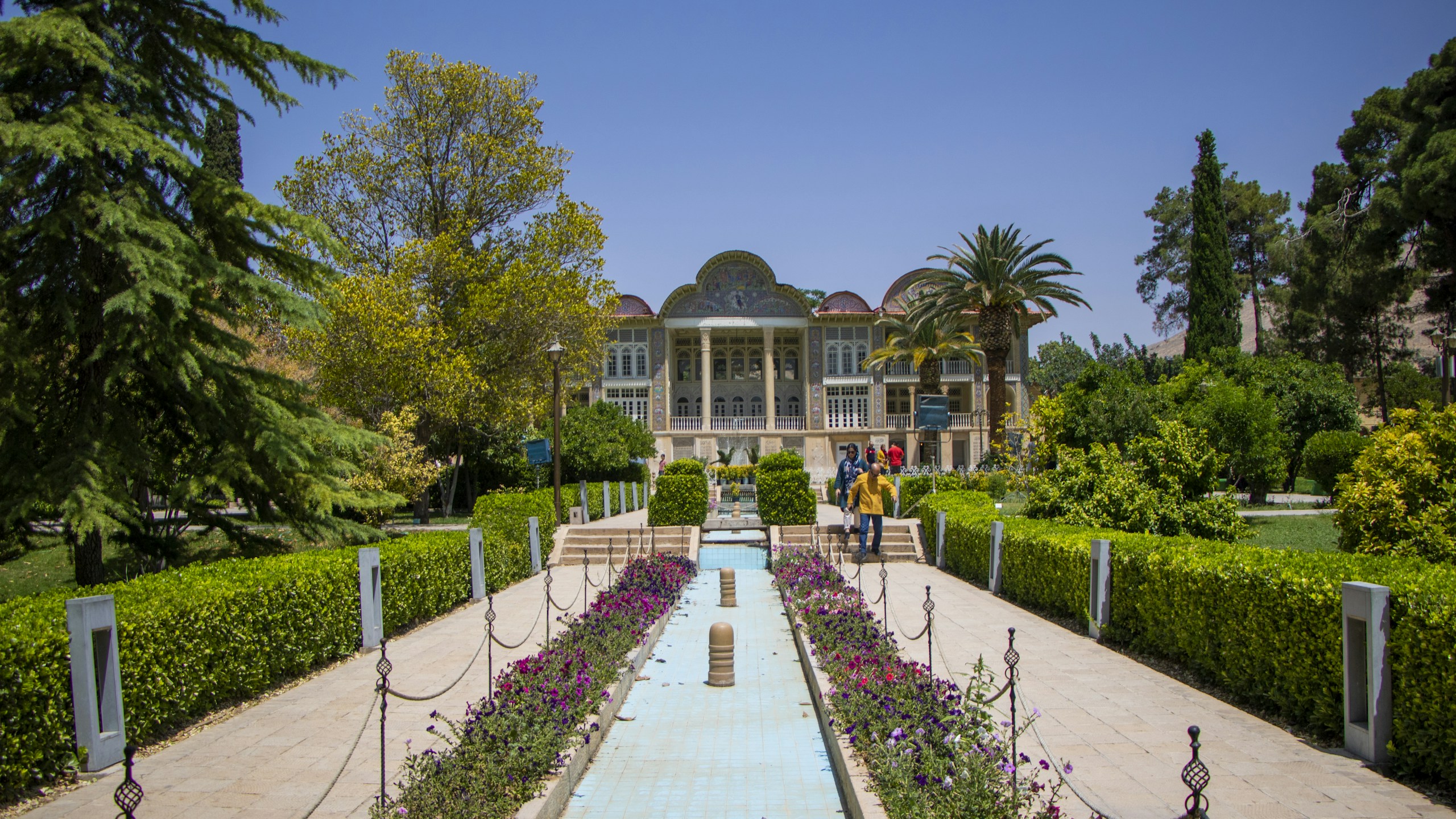
Menat
منت
You know when someone does you a favor, but then they never let you forget it and try to make you feel guilty about it? That’s menat. My Persian-English dictionary defines it as “beholden,” but I don’t think I’ve ever used that word before. I can tell you for certain, though, that menat is part of my everyday (almost) vocabulary. And there’s nothing I hate more than when someone does that.
Sofreh
سفره
Sofreh might sound familiar to some New Yorkers because it’s the name of an Iranian restaurant in Brooklyn. It translates as “tablecloth,” but that’s such an unsatisfactory translation seeing as, for starters, it’s not on any table (not traditionally anyway). Nowadays, it’s quite common to sit at the table, but traditionally, Iranians sit and eat on the floor (which is why when you- the khâreji– keep shifting from position to position, trying to keep your legs from falling asleep, Iranians couldn’t be more comfortable). Sofreh implies a group of friends and family coming together over a laboriously prepared meal. It’s why we have expressions like sofreh-ye del-eto bâz kon (open the sofreh of your heart- “lay it out on the table”). The Haft Sin Table is actually called Sofreh-ye Haft Sin (not miz-e haft sin). And at an Iranian wedding, there’s sofreh-ye aghd (wedding spread/table).
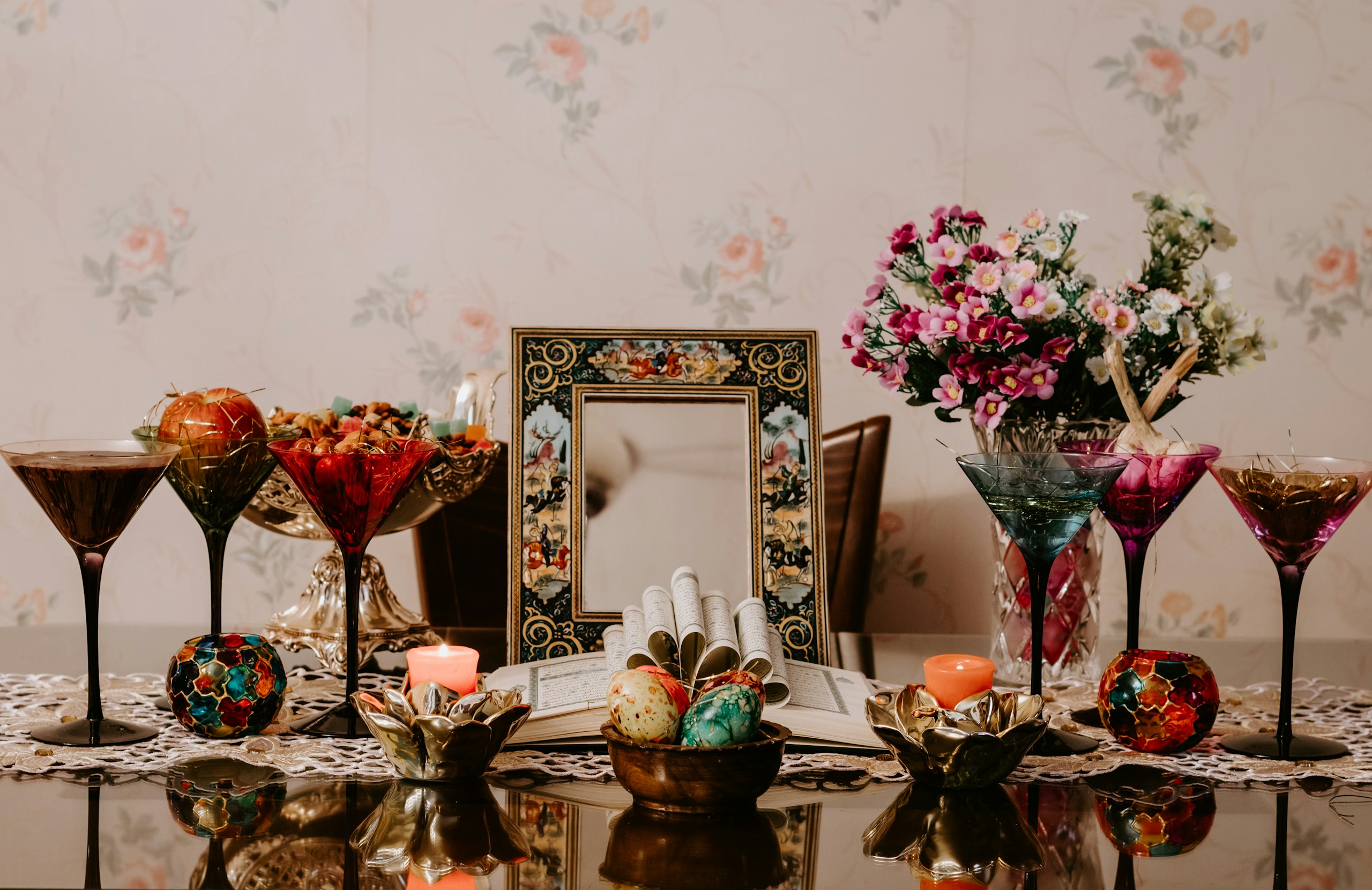
The practical, every day-use ones are made of nylon, which makes cleaning them easier. Laying out the sofreh (sofreh pahn kardan) and setting the sofreh (sofreh chidan) is something that several people help out with… as is cleaning up the sofreh (sofreh jam kardan). For me, the worst part was having to wipe the sofreh clean after meals. In fact, I used to try to time how I would take dishes back into the kitchen so I wouldn’t be the one stuck with sofreh-wiping duty. You had to leave one used dish behind to throw the garbage in. With a damp cloth, you wiped and folded, wiped and folded, until you got to the end. (More detail than you ever wanted/needed to know- I know- but that’s what I do here.)
Now wouldn’t you agree this is all oh-so much more than… tablecloth?
Ghahr kardan
قهر کردن
Ghahr kardan is when you are on non-speaking terms with someone or have a falling out. Being ghahr can last anywhere from a short few hours to years to a lifetime! Growing up, my cousins and I would ghahr with one another at least once a day. Inevitably one of us would do or say something to make the other(s) mad, and then we wouldn’t speak to each other for a while. One of my cousins in particular always used to threaten the rest of us with becoming ghahr. “If you do that, then I’ll be ghahr with you!” Sometimes it worked, sometimes it didn’t.
It’s also worth knowing that the opposite is âshti kardan, “to make up/reconcile,” which is where the “make-up alleys” (explained above) get their name.
Cheshm o ham cheshmi
چشم و همچشمی
I’m pretty sure hyphenated Iranians always say this one in Persian. The closest English translation is “keeping up with the Joneses,” which I’m not crazy about. And honestly, I don’t feel like I hear this a lot in English anyway. But this idea of cheshm o ham cheshmi is unfortunately quite common in Iran and one of the more negative aspects of Iranian culture, in my opinion.
I feel like it’s the cheshm (eye) in this one that makes it so much better in Persian. You might even remember the role of the eye in Iranian superstitions.
Hoz
حوض
I’ve seen hoz defined as “pool” or “fountain,” but given that it’s a feature of traditional Persian architecture and bâgh, neither of these is a really suitable translation. Hoz is a shallow, symmetrical little pool (for lack of a better word) usually centrally-positioned in the courtyard of the house or mosque or wherever it may be. It’s a typical feature of the Persian garden, Persian bathhouses, and traditional houses. Some old houses in Tehran that have been repurposed as cafes have kept the traditional hoz. Some of my aunts also have hoz in their yards, only these days, they’ve filled it with soil and planted flowers inside.
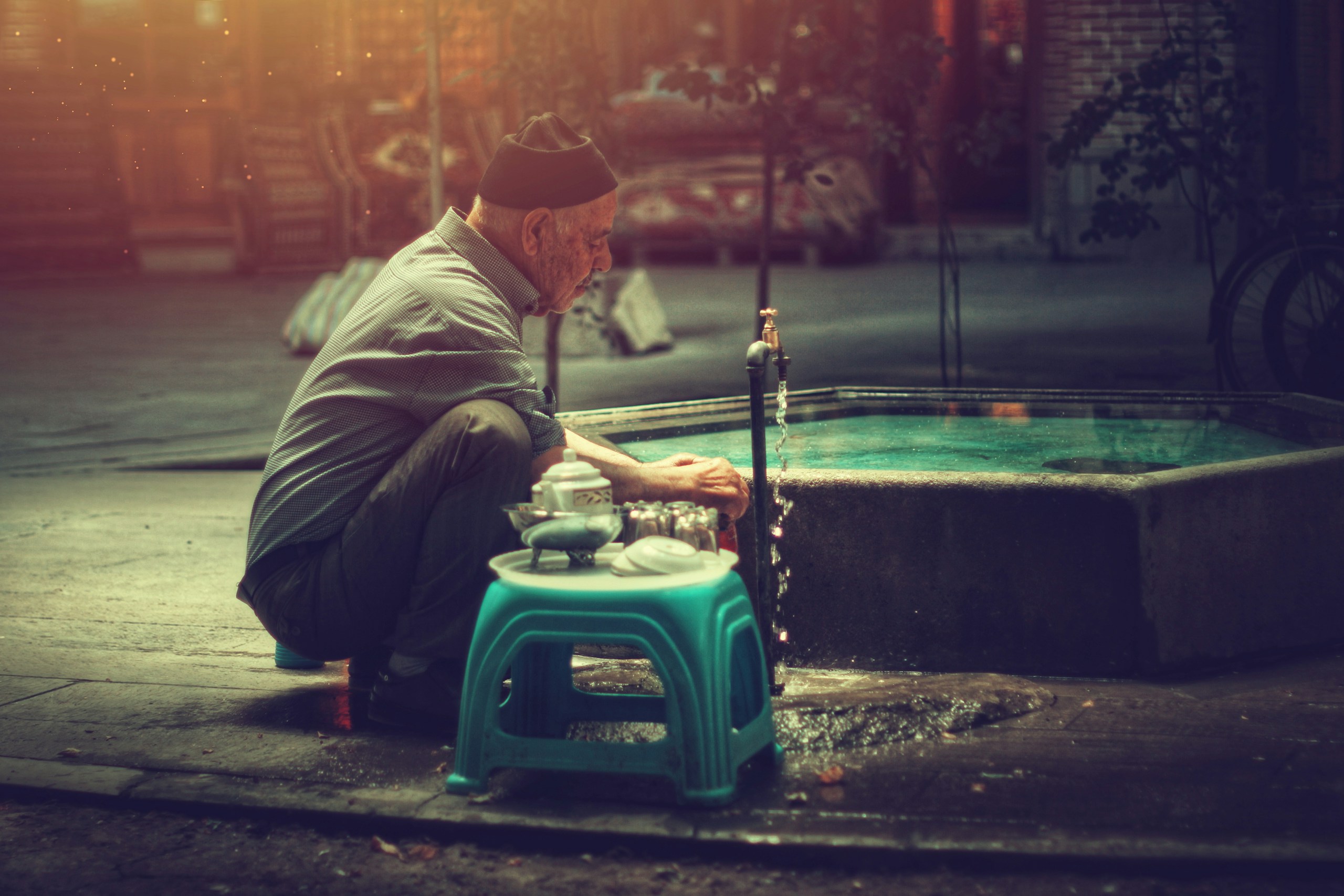
Pâ ghadam-e khub
پا قدم خوب
You know how sometimes a place will be empty, but then you walk in and suddenly a bunch of people show up after you, seemingly out of nowhere? This is what we call pâ ghadam-e khub (a good step). Someone’s step and presence bring someone else some sort of luck (although you could also have pâ ghadam-e bad [a bad step]). Iranians love to pat themselves on the back for having pâ ghadam-e khub, a trait I’m also proud to possess. A while back, I bought greengages from a street vendor who was sitting there twiddling his thumbs, and suddenly 2 more ladies showed up and bought even more than I did! A few weeks later, a friend and I stopped by one of those self-service falafel joints, and it was totally empty. By the time we started eating, all the seats had been taken! I told my friend, “Ajab pâ ghadam-e khubi dâshtim!” (What a great step we had!) And if that doesn’t convince you of my magical, fortune-bringing step, one of my colleagues assured me it was true because apparently any time we have a meeting, he gets a new student! Which makes me think there needs to be a new rule: anyone with pâ ghadam-e khub deserves a discount and/or percentage of the cut for bringing in business with their positive vibes.
Share it on Pinterest


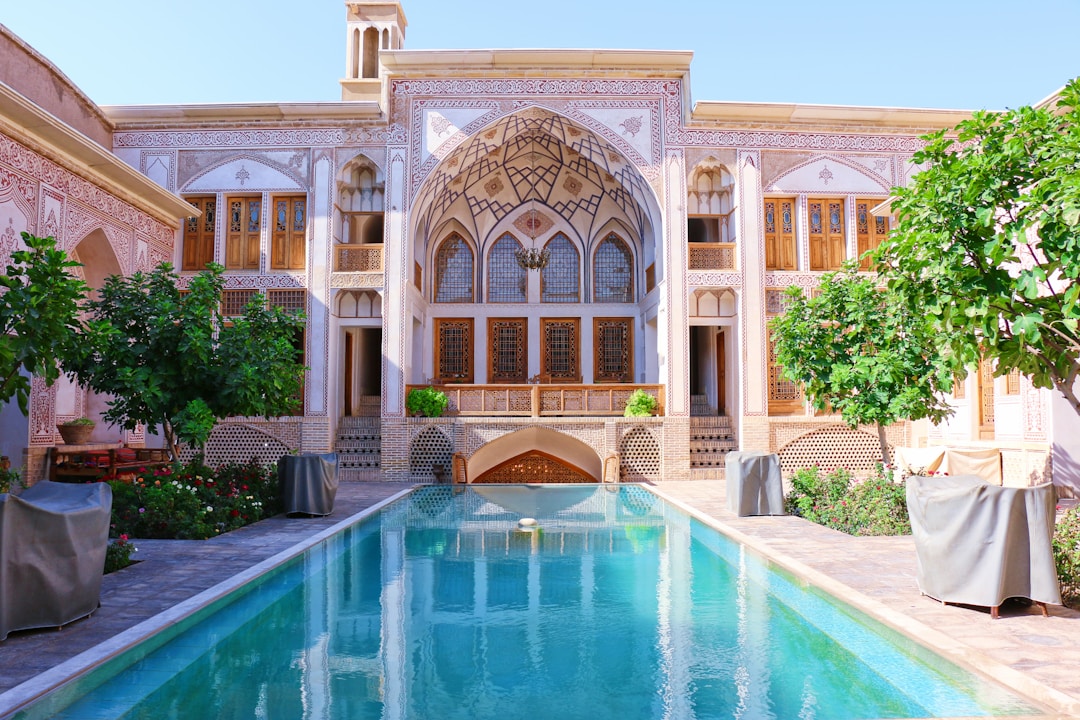



Murray Ankrom
20 September 2020 at 15:00ممنون دختر
خیلی مفید مفید برای من بودن
من فارسی را یاد می گیرم
من در کانادا زندگی می کنم
زبان فارسی زیبا است
خیلی دوست دارم
قربونت
موری
Pontia
20 September 2020 at 16:24سلام موری جان
!چقدر خوب فارسی مینویسی
.خوشحالم که مفید بود و مرسی که خواندی
موفق باشی
Jean
25 September 2020 at 00:09Very interesting.